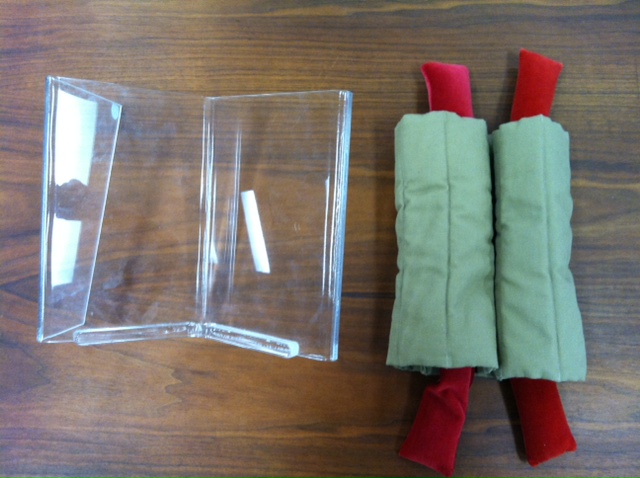What is That?: Book Snake Edition
One of the most common questions we receive when new patrons enter the reading room is “what are those things on the desks?” Most users are able to identify the clear acrylic (plexiglas) stands as book cradles (used to support a book while it’s being read), but the cushion-y, fabric-based “things” lying next to them present more of a mystery.
These are in fact another type of book support: one that consists of a roll-able, padded mat called a “book futon” and two long, pliable, cylindrical objects called “book snakes.” Since some of the volumes in our collections can be quite fragile, it is important to limit the stress on their bindings during use. By rolling the ends of a book futon (or futons) around book snakes, you can create an adjustable support to accommodate books of various sizes. The goal is to arrange the futon and snakes so that the volume lies open at a safe angle, with its “boards” supported. This minimizes the pressure on the book’s spine and hinges. Smaller book snakes (sometimes referred to affectionately as “book worms”) may be positioned on the book to keep it open to a given page.
Book snakes are not only an essential tool when handling rare and fragile books; they can also prove quite handy for the average reader at home! (Think about all of the times that you’ve struggled to keep a cookbook open while following a recipe or have needed to prop a book open in order to take notes). Fortunately, making your own book snake is a relatively easy craft project. Roberta Woodrick of KU Libraries’ Conservation Services has made a wonderful video tutorial to walk you step by step through the process. The tutorial is based on the guidelines of Jennifer Hain Teper, Conservation Librarian at the University of Illinois at Urbana-Champaign. Enjoy!
How to Make a Book Snake, with Roberta Woodrick
Roberta Woodrick
Assistant Conservator, Conservation Services
and
Elspeth Healey
Special Collections Librarian
Tags: Book Cradles, Book Futons, Book Snakes, Book Supports, Book Worms, Conservation Services, crafts, Elspeth Healey, Jennifer Hain Teper, Roberta Woodrick


